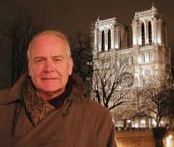Lonely in Paris? A little reaching out will bring you neighbors, acquaintances, colleagues, allies, then friends and even, as the love-ads tease, “more if affinities.” Meet them all in a nearby café or bistro. Make it a familiar and beloved haunt.
Call it your pub, your local, your watering-hole. It’s a family for loners, an extended, cocooned identity. It’s comforting, recharging, informal, embracing. It’s a place for irony, even cynicism, about the trials and follies of society. It’s a refuge for good times and bad. It’s the center of your village, a welcome-home hideout where a smile and a handshake can open many doors. Speaking of opening doors, read on as we set some context.
Belying boxer’s broken nose and beefy build, Fred Chevallier glides around his namesake bistro like a ballet-dancer. He serves up cognac, petits rouges and rum grogs with darting handshake, grin and hearty Comment ça va? He and his crew are the soul of rue d’Assas – well, between rue de Fleurus and rue Vavin. His beautiful young wife Virginie charms clients with easy grace and patient ear. His Tamil chef Siva is the Escoffier of grilled salmon, steak-frites and thick, runny omelets.
Au Chevallier, our handy neighborhood pub, is a real-McCoy cantine – a favorite local eatery and drinking-shop, a place where coziness, complicity and value for money conspire to make you happy.
Localness in this ever-walkable city is all. Paris may be a great world city, a fantasy of beauty and romance. But for Parisians it’s a loose confederation of villages. Each covers maybe four or five streets. Each covers inhabitants and admirers with a cloak of hominess.
Fred Chevallier’s (and my) village snuggles between Montparnasse and the Luxembourg Garden. It shelters trendies, bureaucrats, politicians, actors, artists, doctors, spies, and a rich sprinkling of riff-raff like scribblers for foreign newspapers. It’s also full of folks just making a living. They may camp in a small loft or “maid’s room” (from days when people had servants). But they’re part of our village cosmos, the handful of streets that make up our quartier. You can be poor in space here (my cleaning-lady lives in seven square meters), yet when you step outside you’re rich, for you’re in the heart of Paris.
In all Paris’s villages, merchants are your real neighbors. Your “Arab” convenience store, your druggist, baker and hardware man become at least pro forma confidants. Fellow apartment-dwellers tend to be aloof, though moves are afoot to favor conviviality. Once a year, mayors encourage residents to put picnic tables out on the sidewalk and bring food and wine – a practice raggedly followed. But a new website called Peuplade is taking off: it favors immediate-neighborhood get-togethers. Sneaky sub-agenda: online romance.
Yet of all the links that tie your village together, your cantine matters most. Feeding stomach and soul, it gives you an incomparable sense of well-being and belonging. Fickle as I am, I have four cantines, each for a different occasion. On a chilly day, I stroll to the Brasserie Lutetia for a fix of the most sinful, buttery purée de pommes de terre the devil ever imagined, with three pieces of tender chicken floating in a copper-pot of the stuff. Okay, I also go to ogle movie-stars: maybe Sophie Marceau or Juliette Binoche.
For a celebration, I walk seven minutes to the Closerie des Lilas, where Lenin and Trotsky played chess, Picasso imagined wild sketchings, and Hemingway hoisted more than his fair share. For a classy light lunch, I slip around the corner to Bread and Roses for a chat with my pal, owner Philippe Tailleur, over a gourmet tuna sandwich and a glass of velvety Bordeaux.
But my old-faithful cantine remains Au Chevallier, right across rue d’Assas from my ground-floor apartment. I drop in once a week when I sense my own cooking is poisoning me. With a three-course meal plus wine for twenty-seven dollars, I get friendship, sympathy and shared exultation.
But help too. Last year I cleverly locked myself out of my apartment at 10 p.m. I popped over to Au Chevallier to find Fred and four clients at the bar: a nearly toothless old man with a fund of appallingly crude jokes about then-presidential candidate Ségolène Royal; a young Mauritian; a mysterious Spanish lady; and a tough-looking handyman.
The handyman, it seems, was handy at break-ins, and just happened to have his tools. He tried to break my window, but amazingly couldn’t crack the double glaze. We went back for Fred’s moral and liquid encouragement. Fevered cogitations followed wild hypotheses, all aptly fueled. Finally, Fred asked: “Why not slip a piece of plastic between the door and the frame? Take a menu (plasticized) and see what happens.” We did, and it worked – Fred and I hurling shoulders into the door in the spirit of Henry V’s 1417 “once more unto the breach” assault on the walls of besieged Honfleur.
Gloating, we marched inside, faced my disdainful cat, then went back for a round (well, three) on me. Applause, laughter and self-congratulation. All six habitués agreed this was a grand victory -- for international brotherhood, Au Chevallier’s magic menu and, above all, our cantine.
